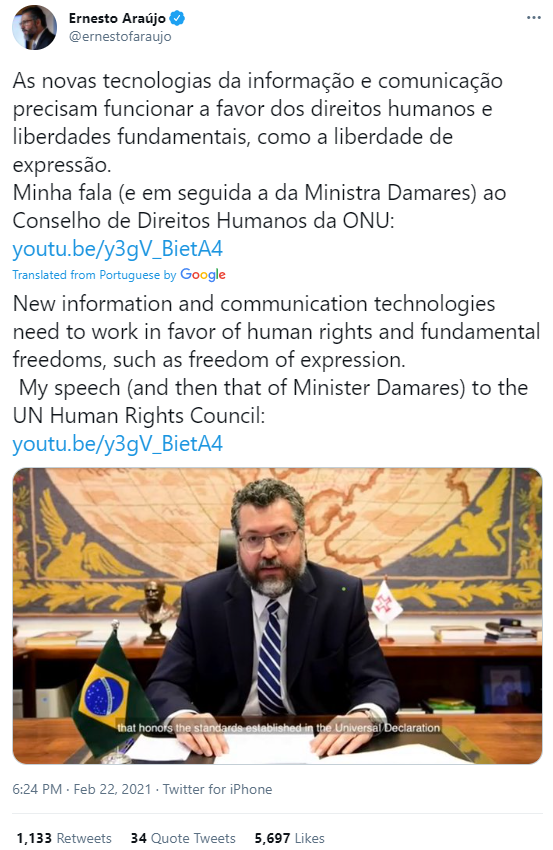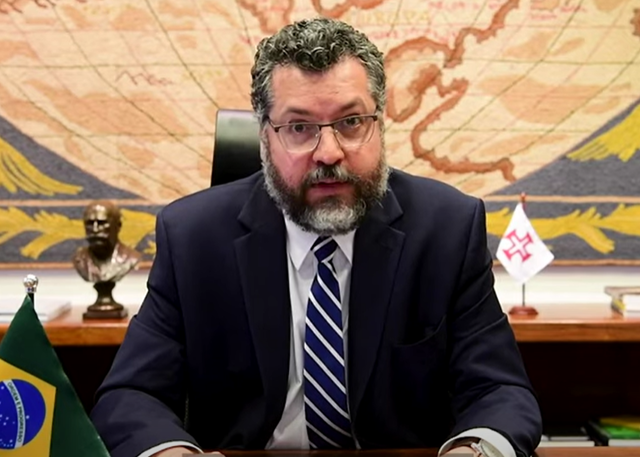Brazil’s minister of foreign affairs warns the United Nations Human Rights Council (UNHRC) of a creeping techno-totalitarianism exploiting the coronavirus pandemic for social control through censorship and surveillance.
Addressing the 46th Session of the United Nations Human Rights Council on Monday, Brazil’s Minister of Foreign Affairs Ernesto Araujo said that future generations may look back on the issue of freedom of expression in the face of new technologies as the defining debate of our time.
The Brazilian foreign minister recognized that entire societies were being conditioned to believe that freedom had to be sacrificed in the name of public health while information and communication technologies were being increasingly subjected to censorship, surveillance, and mechanisms for social control.
“The rising tide of internet control by different actors, driven by economic or ideological goals, has to be stopped” — Ernesto Araujo
As in his previous address to the UN, Araujo once again urged nations to stand up for the notions of freedom of expression and human dignity that were laid out in the UN’s 1948 Universal Declaration of Human Rights.
Article 19 in particular states: “Everyone has the right to freedom of opinion and expression; this right includes freedom to hold opinions without interference and to seek, receive and impart information and ideas through any media and regardless of frontiers.”
At the end of his brief speech, Araujo urged everyone “to discuss with urgency and depth, the topic of freedom of expression in the face of new technologies,” so that “humanity can make a technological leap without falling into the abyss of self-destruction.”
Below is Araujo’s speech to the UNHRC in its entirety, transcribed and translated into English.
“We cannot accept a lockdown of the human spirit, which fundamentally depends on exercising freedom and human rights to the fullest” — Ernesto Araujo
“It is in our hands to ensure that technology works for, and not against, human rights, democracy, and the rule of law” — Ernesto Araujo
“We believe that the Council currently faces some of the most serious challenges since its creation. The foundations of international human rights law were laid by the 1948 Declaration of Human Rights, which clearly defined fundamental freedoms as a determining element of the dignity of all people.
“However, fundamental freedoms are threatened today by growing challenges, and the COVID crisis has only contributed to exacerbating these trends.
“Whole societies are getting used to the idea that freedom must be sacrificed in the name of health.
“I do not criticize the lockdowns or similar measures that so many countries put in place, but we cannot accept a lockdown of the human spirit, which fundamentally depends on exercising freedom and human rights to the fullest.
“The big challenge today is what I call techno-totalitarianism” — Ernesto Araujo

“Whole societies are getting used to the idea that freedom must be sacrificed in the name of health” — Ernesto Araujo
“We reaffirm our resolve, together with all nations, to work towards an international order that honors the standards established in the Universal Declaration and other international human rights treaties in facing the present challenges.
“And the big challenge today is what I call techno-totalitarianism — from blocking platforms and websites to controlling content and information — from judicial measures and laws that criminalize online activities to the abusive or mistaken use of algorithms.
“The rising tide of internet control by different actors, driven by economic or ideological goals, has to be stopped.
“Technologies have been increasingly subjected to censorship, surveillance, and the creation of mechanisms for social control” — Ernesto Araujo
The pandemic must not lead to totalitarian social control or the abrogation of fundamental freedoms. Freedom is foundational to the UN and essential to human dignity.
Brazil?? stands for freedom.
No to the “Great Reset”
My speech at UN session on Covid:https://t.co/mrxDVKXCSa pic.twitter.com/nxrEagxeEq
— Ernesto Araújo (@ernestofaraujo) December 4, 2020
“Information and communication technologies have brought us the promise of new platforms for freedom of expression, with easier and wider access to information.
“But these technologies have been increasingly subjected to censorship, surveillance, and the creation of mechanisms for social control.
“Any given technology has the potential for liberation, creativity, and wellbeing, and at the same time, it also has destructive potential.
“Throughout the entire human adventure, from the discovery of fire to nuclear energy, the challenge of every era has always been to incorporate technologies in favor of the good of humanity.
“Brazil urges everyone to discuss with urgency and depth, the topic of freedom of expression in the face of new technologies — a discussion that might be remembered by future generations as the great debate of our time” — Ernesto Araujo
“The 21st Century is the century of information technology and artificial intelligence, and our task is to ensure that these help liberate and aggrandize human beings by their intrinsic dignities instead of subjecting or diminishing them by transforming each man and each woman into a simple collection of data to be exploited.
“It is in our hands to ensure that technology works for, and not against, human rights, democracy, and the rule of law.
“With a spirit of openness and dialogue, Brazil urges everyone to discuss with urgency and depth, the topic of freedom of expression in the face of new technologies — a discussion that might be remembered by future generations as the great debate of our time — and invites everyone to establish instruments ensuring that once again humanity can make a technological leap without falling into the abyss of self-destruction.”
Brazil says ‘no’ to great reset: ‘Totalitarian social control is not the remedy for any crisis’
‘Freedom & democracy’ missing from great reset agenda: Brazil’s foreign minister tells WEF president
‘The great reset will dramatically expand the surveillance state via real-time tracking’: Ron Paul












